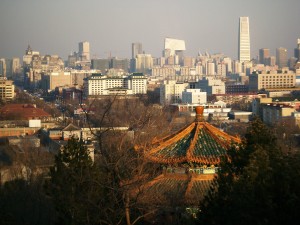My wife and I were treating her niece, Rose DelVicchio, a holiday supper in Beijing. Rose was a junior student at college from NH, who tailored her own summer internship at Beijing Normal University, on subject of juvenile psychology.
 It was one of those becoming-usual super hot and hazy Beijing summer days. We went to one of those movie-set-alike international restaurant blocks, of which all restaurants were likely planned, built and opened on the same day about 3 years ago in a becoming-popular central metropolitan real-estate program. We ordered these stage-prop-alike entries that featured tasteless dishes, but they were vividly-colorful, in disruptively-shaped containers, along with cheap silver wares. Literally on the menu that it was Italian delicacy.
It was one of those becoming-usual super hot and hazy Beijing summer days. We went to one of those movie-set-alike international restaurant blocks, of which all restaurants were likely planned, built and opened on the same day about 3 years ago in a becoming-popular central metropolitan real-estate program. We ordered these stage-prop-alike entries that featured tasteless dishes, but they were vividly-colorful, in disruptively-shaped containers, along with cheap silver wares. Literally on the menu that it was Italian delicacy.
Where we were sitting at, surrounded and staged among, were those wobbling furniture pieces and visually-overflow interior designs that used a lot of pink-paint, milky-white-coat and golden-plate. All these assembled a overwhelming view of strangeness, very fine and very real from far, realizing certainly the designer’s overwhelming expression of his/her kind. Hardly to be convinced for the effort this was just an Annie’s eatery, considered as a very practical low-cost franchise for expat. An Italian Ristorante for local young urban professional to join expats, hung-out in Beijing – that was an widened angle of the business.
We had a second-floor window table. Looked outside it was a street of circus: Heavy Elephant Russian Restaurant, Sound of Music Luxury K-TV Club, Turkish BBQ Restaurant, neon lights, LED lights, laser lights, candle lights, fireworks… the whole alley of them resembled a 1950′ carnival who came to an small town USA. Only difference: this Beijing one were built to stay permanently. These surrounding scenes alone always effectively brought to us, customer/audience/performers of the carnival, at dining table, naturally a usual expat chat of China’s present, about Westernization, an expat from West who would not so appreciate, or a young Chinese-American who would usually lesser appreciated, or a AKA Chinese Student Returnee who would complain got “culture shocked” by his/her own country.
Yes, a usual argument would go on and on with how West should have alerted China about good from bad based on their learned lessons, and encouraged China’s own optimal choices, thus voiding making the same mistakes. We all would have liked to see the more traditional way of China being preserved, fascinated about China’s longer culture beyond 20th century, and less enthusiastic about the past 10 years either for China to adapt Western pop culture as its own, or China’s government sponsored Culture-Creation movement. Asking our friend and colleague, a Prof. John Tole and his father-son consulting business who recently came to China for a Overseas Senior Talent Contest to enter Hanzhou Future Tech City, the scene we again found ourselves being surrounded in Beijing resembled totally as the Toles told me that Xi-to-Dong one-way tunnel of hallucination with carnival clown dress color and fairy wheel neon lights from his childhood experiences back to their small town on US East Coast. I still could not figure out what “tunnel “that they walked through, when their wandered out from a bar at Bund of Shanghai.